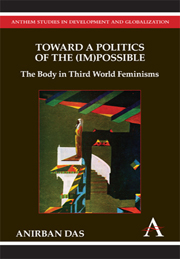Book contents
- Frontmatter
- Contents
- Acknowledgements
- Introduction
- 1 Body, Power and Ideology
- 2 Thinking the Body: Metaphoricity of the Corporeal
- 3 Thinking the Body: Negotiating the Other/Death
- 4 Thinking the Body: Beyond the Topos of Man
- 5 Violence and Responsibility: Embodied Feminisms
- In Conclusion: Toward a Politics of the (Im)Possible
- Notes
- Bibliography
- Index
3 - Thinking the Body: Negotiating the Other/Death
Published online by Cambridge University Press: 05 March 2012
- Frontmatter
- Contents
- Acknowledgements
- Introduction
- 1 Body, Power and Ideology
- 2 Thinking the Body: Metaphoricity of the Corporeal
- 3 Thinking the Body: Negotiating the Other/Death
- 4 Thinking the Body: Beyond the Topos of Man
- 5 Violence and Responsibility: Embodied Feminisms
- In Conclusion: Toward a Politics of the (Im)Possible
- Notes
- Bibliography
- Index
Summary
Introduction
An awareness of the inevitable metaphoricity of the corporeal does not refute the fact that the body, although constituted by language, is constituted as the body. As metaphor, it is no less ‘rea’ than ‘reality’. For, in this theoretical frame, the real and the metaphor constitute each other and every ‘real’ or ‘metaphorical’ being has its own specificity. The blurring of the real/metaphor binary does not lead, of itself, to a blurring of the specificity of all conceptmetaphors. On the contrary, the understanding of the generality of the beings may lead on to a better perception of the particulars. In this chapter, I deal with how the notion of the body – which is the master-metaphor for location in space – negotiates with its ultimate other, death. In this negotiation, I mark two distinct moments. In one of these, the modern moment, the body tries to deal with death as a separate other to be won over in battle. In the so-called postmodern moment, an apparent dissolution of the body-death binary questions this separation. This moment thus seems to avoid the model of war and winning, only to lead on to a forgetfulness of the other/death. This act of erasure through non-definition remains equally, if not more, violent. The deconstructive gesture that I propose consists in working at the aporia of thinking death in its intimate and unknown embrace with life, through a sense of respect for and responsibility to the ‘other’.
- Type
- Chapter
- Information
- Toward a Politics of the (Im)PossibleThe Body in Third World Feminisms, pp. 73 - 104Publisher: Anthem PressPrint publication year: 2010



